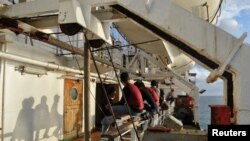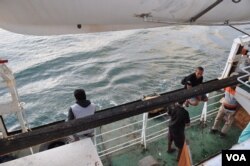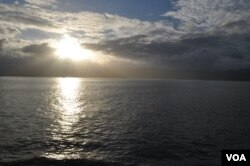Indonesia is an island nation, the world's largest, but it's hard to grasp what that means in Java or Sumatra, its most populous islands, which are so huge and diverse as to be almost self-contained.
But outside those two, which hold more than 70 percent of the country's 260 million people, there are at least 13,000 more inhabited islands. To really grasp what this entails, consider the role of Pelni, Indonesia's national shipping company, whose ferries are a lifeline for the millions of Indonesians in the country's less-developed eastern half.
Pelni, short for Pelayaran Nasional Indonesia, or Indonesian National Shipping, has a fleet of 26 passenger ships that unhurriedly loop around the archipelago, circulating families, workers and goods. Whereas Java and Bali are ringed with fertile paddies, residents of a place like the remote volcanic Banda Islands, in Central Maluku, must get shipments of staple foods like rice and sugar from a Pelni ferry that pulls up once a week or two. Sometimes places like this will run out of milk between shipments and there is only condensed milk to stir into your coffee until the next Pelni arrives.
Indonesia's island nature has become newly prominent in light of its recent moves to enforce maritime sovereignty, both by renaming part of the South China Sea and flashily blowing up illegal fishing boats. The dated but tenacious institution that is Pelni encapsulates the sheer ambition of governing a vast, decentralized archipelago.
Aboard the KM Pangrango
Pelni was founded in 1952, shortly after independence from Dutch colonization in 1945, first with 12 ships from the new Indonesian Central Shipping Authority, and then with 45 more that it purchased from Germany, Italy and Belgium. It was a powerful symbolic move for the young country to start taking control of its own shipping routes from the Dutch KPM shipping company.
The KM Pangrango is, today, one of the smaller ferries, with a capacity of 500 people (although it sometimes absorbs a couple hundred more). It makes a two-week loop from Ambon through the Maluku Islands, including the Banda Islands, which were once the center of the global spice trade.
On a 15-hour leg from Ambon, the capital of Maluku province, to Banda Neira, the main port of the Banda Islands, hundreds of Indonesians boarded with tickets that cost about $7 for deck class.
"It's the only reliable way to get in and out of Banda Neira, especially in this season when the sea is rough," said Jabar Buang, a young electrician in Neira. (There is sometimes a fast boat from Banda Neira to Ambon, but it is too dangerous for them to run in July.) "I always take the Pangrango, Tidar or Nggapulu boats in and out of town, to Ambon, Makassar, Papua … wherever I need to work."
There are private cabins on the five-level Pangrango, but most of its passengers sleep in dormlike platforms. There are little boxed meals of rice and fish, the Muslim call to prayer is broadcast five times a day on the open seas, and there is an impressive quantity of clove cigarettes being smoked; years of the scent have accumulated in the bed linens and bathrooms. Some of the larger Pelni ferries have karaoke rooms.
On Run, another Banda island, a 35-year-old woman named Hariro said Pelni ferries were the only way for her to visit her hometown of Semarang, Central Java.
"For me to visit my family for the end of Ramadan, I have to take a weeklong Pelni from Banda Naira to Surabaya, in East Java," she said. "And then a bus to Semarang. The round trip is longer than the time I have at home! But it's worth it to see my family, even if it is only once every few years."
Local economies, history
In the port towns serviced by Pelnis, the docking of a ferry is itself an event. In Banda Neira, which still trades heavily in nutmeg and mace, the streets come alive with vendors and shops.
"I do half my business when passengers get off the boat," joked one woman selling sticky rice and candied nutmeg near the harbor.
It's hard to describe just how far Eastern Indonesia — Maluku, Papua, West Timor — can feel from Jakarta, the capital. Many of its residents will never see Java, and often, federal government services don't make it to them either. Run does not get electricity from the government, for instance. President Jokowi has made commercial shipping routes a Pelni priority, to drive down the cost of goods like rice and cement in eastern provinces.
Pelni routes have been cut in recent years because of competition from budget air carriers, so they need a degree of government subsidization. Each slashed route eliminates a lifeline for poor Indonesians who are priced out of even the cheapest planes.
Still, at 65 years old, the remarkable part of the Pelni is not its diminished capacity but that it still runs, mostly everywhere, mostly on time.






